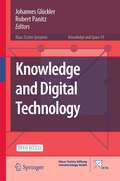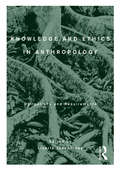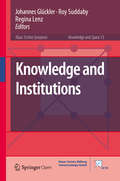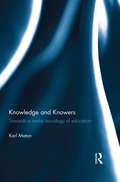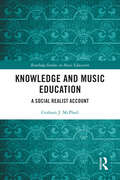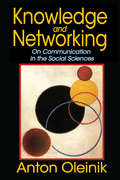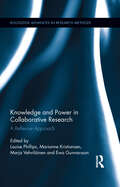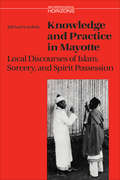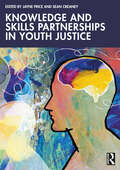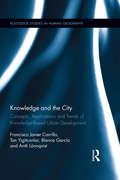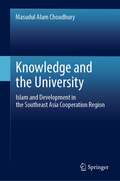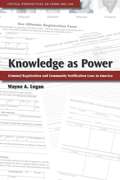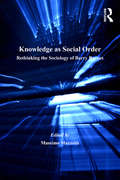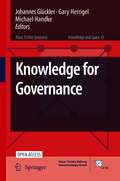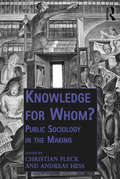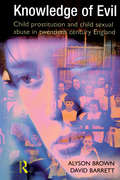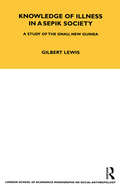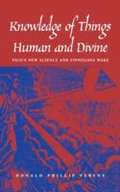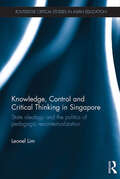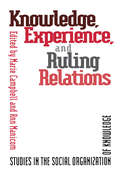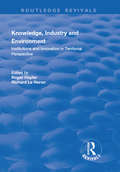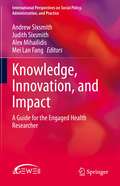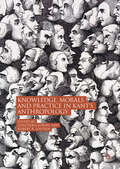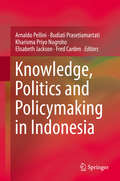- Table View
- List View
Knowledge and Digital Technology (Knowledge and Space #19)
by Johannes Glückler Robert PanitzThis open access book explores the multifaceted interplay of technology, knowledge, and place. While digital technology is increasingly influencing our way of knowing, conversely it is itself the consequence of human creativity and local social interaction. Part I analyzes how digital technologies transform markets through artificial intelligence and decentralized blockchain models. Its contributions discuss novel governance mechanisms, including the responsible use and analysis of big data. Part II illustrates various ways in which technology supports humanity, be it algorithms supporting complex decision-making processes or the use of robotics in care services. The chapters highlight that technology's efficiency and potential rely on social norms and human capital. Finally, Part III shows that digitization is generating vibrant entrepreneurship, reflected in geographically clustered urban scale-up economies, as well as opening up new ways for people to connect with one another, organize civic engagement and enable new forms of labor. The book offers theoretical reflections as well as empirical cases from the United States, Canada, Japan, South Africa, and Europe. This volume provides a valuable read for scholars, students and professionals in the fields of knowledge creation, technology and governance.
Knowledge and Ethics in Anthropology: Obligations and Requirements (Criminal Practice Ser. #31)
by Lisette JosephidesInspired by the work of world-renowned anthropologist Marilyn Strathern, this collection of essays features contributions from a range of internationally recognized scholars – including Strathern herself – which examine a range of methodologies and approaches to the anthropology of knowledge.The book investigates the production of knowledge through a variety of themes, centered on the question of the researcher’s obligations and the requirements of knowledge. These range from the obligation to connect with local culture and existing anthropological knowledge, to the need to draw conclusions and circulate what has been learned. Taking up themes that are relevant for anthropology as a whole – particularly the topic of knowledge and the ethics of knowing others, as well as the notion of the local in a global world – Knowledge and Ethics in Anthropology is key reading for students and scholars alike. A thorough introduction to the key concepts and terms used in Strathern’s work is provided, making this a fantastic resource for anyone encountering her work for the first time.
Knowledge and Institutions (Knowledge and Space #13)
by Roy Suddaby Johannes Glückler Regina LenzThis open access book bridges the disciplinary boundaries within the social sciences to explore the role of social institutions in shaping geographical contexts, and in creating new knowledge. It includes theorizations as well as original empirical case studies on the emergence, maintenance and change of institutions as well as on their constraining and enabling effects on innovation, entrepreneurship, art and cultural heritage, often at regional scales across Europe and North America. Rooted in the disciplines of management and organization studies, sociology, geography, political science, and economics the contributors all take comprehensive approaches to carve out the specific contextuality of institutions as well as their impact on societal outcomes. Not only does this book offer detailed insights into current debates in institutional theory, it also provides background for scholars, students, and professionals at the intersection between regional development, policy-making, and regulation.
Knowledge and Knowers: Towards a realist sociology of education (Legitimation Code Theory)
by Karl MatonWe live in ‘knowledge societies’ and work in ‘knowledge economies’, but accounts of social change treat knowledge as homogeneous and neutral. While knowledge should be central to educational research, it focuses on processes of knowing and condemns studies of knowledge as essentialist. This book unfolds a sophisticated theoretical framework for analysing knowledge practices: Legitimation Code Theory or ‘LCT’. By extending and integrating the influential approaches of Pierre Bourdieu and Basil Bernstein, LCT offers a practical means for overcoming knowledge-blindness without succumbing to essentialism or relativism. Through detailed studies of pressing issues in education, the book sets out the multi-dimensional conceptual toolkit of LCT and shows how it can be used in research. Chapters introduce concepts by exploring topics across the disciplinary and institutional maps of education: -how to enable cumulative learning at school and university-the unfounded popularity of ‘student-centred learning’ and constructivism -the rise and demise of British cultural studies in higher education-the positive role of canons -proclaimed ‘revolutions’ in social science -the ‘two cultures’ debate between science and humanities-how to build cumulative knowledge in research-the unpopularity of school Music-how current debates in economics and physics are creating major schisms in those fields. LCT is a rapidly growing approach to the study of education, knowledge and practice, and this landmark book is the first to systematically set out key aspects of this theory. It offers an explanatory framework for empirical research, applicable to a wide range of practices and social fields, and will be essential reading for all serious students and scholars of education and sociology.
Knowledge and Music Education: A Social Realist Account (Routledge Studies in Music Education)
by Graham J. McPhailKnowledge and Music Education: A Social Realist Account explores current challenges for music education in relation to wider philosophical and political debates, and seeks to find a way forward for the field by rethinking the nature and value of epistemic knowledge in the wake of postmodern critiques. Focusing on secondary school music, and considering changes in approaches to teaching over time, this book seeks to understand the forces at play that enhance or undermine music’s contribution to a socially just curriculum for all. The author argues that the unique nature of disciplinary-derived knowledge provides students with essential cognitive development, and must be integrated with the turn to more inclusive, student-centred, and culturally responsive teaching. Connecting theoretical issues with concrete curriculum design, the book considers how we can give music students the benefits of specialised subject knowledge without returning to a traditional past.
Knowledge and Networking: On Communication in the Social Sciences
by Anton OleinikSuccess and career growth in academic life depend upon reaching and influencing the widest audience possible. To do so, scientists strive to develop personalized trust. They do so by establishing a large number of connections through networking and also through the strength of their arguments and the validity and reliability of their research. To secure increasingly rare tenure positions and achieve salary increases, promotions, and recognition, scholars place themselves on a continuum of priorities ranging from total emphasis on networking to complete focus on advancing knowledge, trying to find some middle ground between the two extremes. Anton Oleinik argues that when scholars prioritize networking, science reproduces features of a "small world," in which personal connections prevail. Who knows whom matters more than who knows what. In this scenario, one's status derives more from affiliation with a specific group of scholars or a particular university than from contributing to advancing knowledge. Acknowledging that it would be a mistake to consider networking the main source of evils in science, Oleinik instead criticizes the decisions scholars make while struggling to find that middle ground between networking and advancing knowledge, and managing conflicts between these priorities. The fierce competition for increasingly scarce research funds, and the difficulty of finding jobs in academia underlines the growing importance of the choices made by an academic. Though Oleinik focuses particularly on the social sciences, his ideas are just as relevant to other disciplinary areas.
Knowledge and Power in Collaborative Research: A Reflexive Approach (Routledge Advances in Research Methods #6)
by Louise Phillips Ewa Gunnarsson Marianne Kristiansen Marja VehviläinenCollaborative research embraces a multiplicity of practices in which social actors are invited to participate in the research process as co-producers of knowledge. But what is actually meant by “co-production” in collaborative research? Knowledge and Power in Collaborative Research presents a range of critical, reflexive strategies for understanding and tackling the challenges emanating from the tensions that arise in the meeting between different participants, knowledge forms and knowledge interests. The chapters anchor discussion of ethical, epistemological and methodological questions in sustained empirical analyses of cases of collaborative knowledge production. The book covers diverse theoretical approaches such as dialogic communication theory, actor network theory, poststructuralist writing as inquiry, institutional ethnography, dialogic action research, and pragmatic action research. The empirical cases span a broad spectrum of empirical fields of social practice: health services, organisational change, research, science communication, environmental communication in intermediary NGOs, participatory governance in relation to urban planning, and digital communication and virtual worlds.
Knowledge and Power in Prehistoric Societies
by Lynne KellyIn this book, Lynne Kelly explores the role of formal knowledge systems in small-scale oral cultures in both historic and archaeological contexts. In the first part, she examines knowledge systems within historically recorded oral cultures, showing how the link between power and the control of knowledge is established. Analyzing the material mnemonic devices used by documented oral cultures, she demonstrates how early societies maintained a vast corpus of pragmatic information concerning animal behavior, plant properties, navigation, astronomy, genealogies, laws and trade agreements, among other matters. In the second part Kelly turns to the archaeological record of three sites, Chaco Canyon, Poverty Point and Stonehenge, offering new insights into the purpose of the monuments and associated decorated objects. This book demonstrates how an understanding of rational intellect, pragmatic knowledge and mnemonic technologies in prehistoric societies offers a new tool for analysis of monumental structures built by non-literate cultures.
Knowledge and Practice in Mayotte: Local Discourses of Islam, Sorcery and Spirit Possession
by Michael LambekOn the East African island of Mayotte, Islam co-exists with two other systems of understanding and interpreting the world around its inhabitants: cosmology and spirit-mediumship. In a witty, evocative style accessible to both the specialist and non-specialist reader, Michael Lambek provides a significant contribution to writing on African systems of thought, on local forms of religious and therapeutic practice, on social accountability, and on the place of explicit forms of knowledge in the analysis of non-western societies.The "objectified" textual knowledge characteristic of Islam and of cosmology is contrasted with the "embodied" knowledge of spirit possession. Lambek emphasizes the power and authority constituted by each discipline, as well as the challenge that each kind of knowledge presents to the others and their resolution in daily practice. "Disciplines" are defined as an organized body of practitioners or adepts, a concept precise and useful when applied to the contexts of Lambek's own research and equally so in the study of comparable environments elsewhere.Essential reading for those interested in the comparative study of Islamic societies, Lambek's argument directly contributes to the main anthropological arguments of the day concerning the social and cultural basis of systems of knowledge and ethnographic strategies for depicting them.
Knowledge and Skills Partnerships in Youth Justice
by Jayne PriceProviding in-depth insight into different types of knowledge and skills partnerships in youth justice, this book illustrates the importance of collaborative working between academics and professionals, drawing on empirical research and practice examples to present expert analysis of knowledge/evidence production and utilisation in youth justice.Original and cutting edge, the focus of this edited collection is on different forms of knowledge exchange (transfer) between professionals and academics in the youth justice context. Authored by experts in the field, each chapter presents a series of case studies showcasing the application of theory/evidence to practice, and shedding light on the challenges professionals experience when seeking to understand complex theory and ‘make sense’ of the vast array of empirical data.Knowledge and Skills Partnerships in Youth Justice will appeal to students researching youth justice and criminal justice systems. The book will also be useful for practitioners of youth justice, as well as policymakers.
Knowledge and the City: Concepts, Applications and Trends of Knowledge-Based Urban Development (Routledge Studies in Human Geography #52)
by Tan Yigitcanlar Francisco Javier Carrillo Blanca García Antti LönnqvistThis book underlines the growing importance of knowledge for the competitiveness of cities and their regions. Examining the role of knowledge - in its economic, socio-cultural, spatial and institutional forms - for urban and regional development, identifying the preconditions for innovative use of urban and regional knowledge assets and resources, and developing new methods to evaluate the performance and potential of knowledge-based urban and regional development, the book provides an in-depth and comprehensive understanding of both theoretical and practical aspects of knowledge-based development and its implications and prospects for cities and regions.
Knowledge and the University: Islam and Development in the Southeast Asia Cooperation Region
by Masudul Alam ChoudhuryThis book looks at a substantively new model of educational philosophy and its application within the field of tertiary education, in relation to socio-economic development in Southeast Asian members of the Organization of Islamic Conferences (OIC). Focusing on and drawing from the cross-regional South East Asian Cooperation (SEACO), a network promoting regional economic cooperation, the author presents a thoughtful evocation of a new orientation to educational philosophy and policy within the development context in the time of, and relating to, COVID-19. The generalized worldview of Islamic educational and socio-economic development model is laid down in relation to the philosophy of education and an ethical-scientific structure of development in terms of the theory of knowledge (epistemology, episteme). The foundation of scientific thought and a comparative Islamic worldview in understanding the unified reality of ‘everything’ is presented. The objectivity of socio-scientific learning at all levels of educational development is further explained within the context of SEACO and its think tank vis-à-vis a reconstructive perspective in which the Islamic episteme of the unity of knowledge and its substantive methodology is addressed and unpacked. The book is relevant to policymakers and scholarly researchers in Islamic philosophy and development and higher education in Southeast Asia and in the Muslim world and more broadly for the world of learning.
Knowledge as Power
by Wayne A. LoganSocieties have long sought security by identifying potentially dangerous individuals in their midst. America is surely no exception. Knowledge as Powertraces the evolution of a modern technique that has come to enjoy nationwide popularity-criminal registration laws. Registration, which originated in the 1930s as a means of monitoring gangsters, went largely unused for decades before experiencing a dramatic resurgence in the 1990s. Since then it has been complemented by community notification laws which, like the "Wanted" posters of the Frontier West, publicly disclose registrants' identifying information, involving entire communities in the criminal monitoring process. Knowledge as Powerprovides the first in-depth history and analysis of criminal registration and community notification laws, examining the potent forces driving their rapid nationwide proliferation in the 1990s through today, as well as exploring how the laws have affected the nation's law, society, and governance. In doing so, the book provides compelling insights into the manifold ways in which registration and notification reflect and influence life in modern America.
Knowledge as Social Order: Rethinking the Sociology of Barry Barnes
by Massimo MazzottiInvestigating a theme first pioneered by Barry Barnes in the early 1970s, this volume explores the relationship between social order and legitimate knowledge and is intended as a tribute to Barnes' seminal role in the development of the discipline of science and technology studies (STS). The contributors highlight the way in which Barnes' work has shaped their way of conceptualizing the basic relation between knowledge and society. In doing this they explore the original sociological underpinnings of STS while pointing to the way in which Barnes' interdisciplinary work has been developed to tackle current concerns in the field as well as in social theory. They also address the concerns of social scientists who are investigating the nature of power and agency and the problem of social order, emphasizing the essential role played by scientific knowledge and technological machinery in the construction of social life. Contributors to the volume include Martin Kusch, Steven Loyal, Mark Haugaard, David Bloor, Trevor Pinch, John Dupre, Donald MacKenzie, Harry Collins, Steven Shapin and Karin Knorr Cetina.
Knowledge for Governance (Knowledge and Space #15)
by Johannes Glückler Gary Herrigel Michael HandkeThis open access book focuses on theoretical and empirical intersections between governance, knowledge and space from an interdisciplinary perspective. The contributions elucidate how knowledge is a prerequisite as well as a driver of governance efficacy, and conversely, how governance affects the creation and use of knowledge and innovation in geographical context. Scholars from the fields of anthropology, economics, geography, public administration, political science, sociology, and organization studies provide original theoretical discussions along these interdependencies. Moreover, a variety of empirical chapters on governance issues, ranging from regional and national to global scales and covering case studies in Australia, Europe, Latina America, North America and South Africa demonstrate that geography and space are not only important contexts for governance that affect the contingent outcomes of governance blueprints. Governance also creates spaces. It affects the geographical confines as well as the quality of opportunities and constraints that actors enjoy to establish legitimate and sustainable ways of social and environmental co-existence.
Knowledge for Whom?: Public Sociology in the Making (Public Intellectuals and the Sociology of Knowledge)
by Christian FleckThis ground-breaking volume is a follow-up to Intellectuals and Their Publics. In contrast to the earlier book, which was mainly concerned with the activity of intellectuals and how it relates to the public, this volume analyses what happens when sociology and sociologists engage with or serve various publics. More specifically, this problem will be studied from the following three angles: How does one become a public sociologist and prominent intellectual in the first place? (Part I) How complex and complicated are the stories of institutions and professional associations when they take on a public role or tackle a major social or political problem? (Part II) How can one investigate the relationship between individual sociologists and intellectuals and their various publics? (Part III) This book will be of interest to academics and students working in the fields of the sociology of knowledge and ideas, the history of social sciences, intellectual history, cultural sociology, and cultural studies.
Knowledge of Evil
by David Barrett Alyson BrownThis book aims to document and analyse the enduring involvement of children in the commercial sex trade in twentieth-century England. It uncovers new evidence to indicate the extent of under-age prostitution over this period, a much-neglected subject despite the increased visibility of children more generally. The authors argue that child prostitution needs to be understood within a broader context of child abuse, and that this provides one of the clearest manifestations of the way in which 'deviant groups' can be conceived of as both victims and threats. The picture of child prostitution which emerges is one of exclusion from mainstream society and the law, and remoteness from the agencies set up to help young people in trouble, which were often reluctant to accept the realities of child prostitution. The evidence provided in this book indicates that the circumstances which have led young people into prostitution over the last hundred years amount, at worst, to physical or psychological abuse or neglect, and at best as the result of limited choice.
Knowledge of Illness in a Sepik Society: A Study of the Gnau, New Guinea Volume 52 (London School Of Economics Monographs On Social Anthropology Ser. #52)
by Gilbert LewisIllness is a matter of concern in every society. Social responses to it depend both on the nature of the illness and on cultural interpretation of its significance. This study of the occurrence, recognition and explanation of illness amongst the Gnau makes use of its author's dual training in medicine and anthropology to show why, how far, and in what respects these people of a forest village in New Guinea turn to their religious and magical knowledge in the distress of illness. The analyis shows how a study of ilness can reveal belief and open an illummatlng and crucial perspective on a society's view of its world.
Knowledge of Things Human and Divine: Vico's New Science and Finnegans Wake
by Donald Phillip VereneThis book takes the reader through the career and works of Giambattista Vico (1668-1744) from a new viewpoint. Two major figures introduced Vico to the twentieth century -- Benedetto Croce and James Joyce. From the mid-twentieth century on there was a growing desire to free Vico from the philosophical idealism of Croce, who in the early part of the century had presented Vico as the Italian Hegel.
Knowledge, Control and Critical Thinking in Singapore: State ideology and the politics of pedagogic recontextualization (Routledge Critical Studies in Asian Education)
by Leonel LimThis book examines how critical thinking is regulated in Singapore through the process of what the influential sociologist of education Basil Bernstein termed "pedagogic recontextualization". The ability of critical thinking to speak to alternative possibilities and individual autonomy as well as its assumptions of a liberal arrangement of society is problematized in Singapore’s socio-political climate. By examining how such curricular discourses are taken up and enacted in the classrooms of two schools that cater to very different groups in society, the book foregrounds the role of traditional high-status knowledge in the elaboration of class formation and develops a critical understanding of post-developmental state initiatives linked to the parable of modernization in Singapore. Knowledge, Control and Critical Thinking in Singapore offers chapters on:• Critical Thinking and the Singapore State: Meritocracy, Illiberalism and Neoliberalism • Sacred Knowledge and Elite Dispositions: Recontextualizing Critical Thinking in an Elite School• Power, Knowledge and Symbolic Control: Official Pedagogic Identities and the Politics of Recontextualization This book will appeal to scholars in comparative education studies, curriculum studies and education reform. It will also interest scholars engaged in Asian studies who are struggling to understand issues of education policy formation and implementation, particularly in the areas of critical thinking and other knowledge skills.
Knowledge, Experience, and Ruling
by Marie Campbell Ann ManicomDorothy Smith is considered one of the most original sociologists and theorists of our time, and her writings have attracted much attention in Europe and the US as well as in Canada. This collection of original essays, written by scholars who worked or studied with Smith, exemplifies Smith's approach to social analysis.Each author takes an empirical approach. Some analyse texts (the maps and documents of land-use planning, photographs, an influential history of British India, reports of a task force on battered women); some draw on interviews (with clerical workers, with Japanese corporate wives), while others (an AIDS activist, a teacher of adult literacy, a social worker) reflect on personal experiences. In each case we are introduced to specific themes in Smith's approach. The essays put Smith's method to work in diverse ways and in the process offer intriguing insights into their topics.This tribute to Smith's empowering contribution as a thinker and teacher reveals how empirical studies can illuminate concepts usually presented in the abstract. As the first compilation of applications of Smith's methodology, this is a landmark work in the developing field of the social organization of knowledge.
Knowledge, Industry and Environment: Institutions and Innovation in Territorial Perspective (Routledge Revivals Ser.)
by Richard Le Heron Roger HayterThis title was first published in 2002. Bringing together a wide range of theoretical and empirical case studies from Canada, New Zealand, South Korea, Turkey, China, Germany, Spain, Sweden, Poland, South Africa, Japan, The Netherlands and the United Kingdom, this book addresses these neglected issues, in particular, contemplating the vitally important nexus between industry, environment and the knowledge economy.Throughout the book, four key themes and issues are explored: institution building strategies; agglomeration as territorial context; sustainable industrial-environmental processes and policy initiatives; globalization, learning and industrial location dynamics. The book concludes with an outline of future research directions within the paradigm.
Knowledge, Innovation, and Impact: A Guide for the Engaged Health Researcher (International Perspectives on Social Policy, Administration, and Practice)
by Andrew Sixsmith Judith Sixsmith Alex Mihailidis Mei Lan FangThis book provides researchers with a straightforward and accessible guide for carrying out research that will help them to combine good science with real-world impact. The format of this book is simple: concise chapters on key topics, examples and case studies, written in plain language that will guide researchers through the process of research-driven innovation. The book draws on the editors’ experience in leading the Age-Well Network of Excellence. The aim of Age-Well is to drive innovation in the area of technology and aging. Researchers often lack the knowledge and abilities to commercialize or mobilize the outcomes of their research. Moreover, there is a lack of training and education resources suitable for the wide range of disciplines and experience that are becoming more typical. The book emphasizes the practicalities of “how to” undertake the kinds of activities that researchers should be engaging in if they are serious about achieving impact. Overall, this book will guide researchers through the process of research-driven innovation.
Knowledge, Morals and Practice in Kant’s Anthropology
by Robert B. Louden Gualtiero LoriniThis volume sheds new light on Immanuel Kant’s conception of anthropology. Neither a careful and widespread search of the sources nor a merely theoretical speculation about Kant’s critical path can fully reveal the necessarily wider horizon of his anthropology. This only comes to light by overcoming all traditional schemes within Kantian studies, and consequently reconsidering the traditional divisions within Kant’s thought. The goal of this book is to highlight an alternative, yet complementary path followed by Kantian anthropology with regard to transcendental philosophy. The present volume intends to develop this path in order to demonstrate how irreducible it is in what concerns some crucial claims of Kant’s philosophy, such as the critical defense of the unity of reason, the search for a new method in metaphysics and the moral outcome of Kant’s thought.
Knowledge, Politics and Policymaking in Indonesia
by Arnaldo Pellini Budiati Prasetiamartati Kharisma Priyo Nugroho Elisabeth Jackson Fred CardenThis edited volume examines key questions about evidence-informed policymaking in Indonesia. It draws on insights and evidence acquired through the implementation of the Knowledge Sector Initiative, a donor-funded programme that aims to increase the demand for and use of evidence in policymaking in Indonesia. Featuring contributions from academics, policy researchers, policymakers and development practitioners, the volume will deepen readers’ understanding of how knowledge and politics shape the policymaking process in Indonesia. As such, it will be of interest to Indonesian and international researchers, academics, students, practitioners and policymakers concerned with various aspects of evidence-informed policymaking research and processes. In particular, regional and international development practitioners and development partners interested in learning from Indonesia’s efforts to improve how evidence is used to address key development challenges will find this volume valuable.
